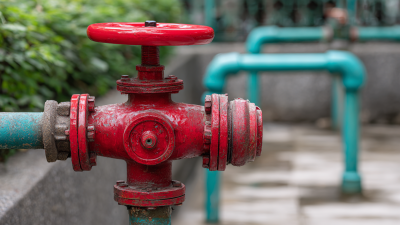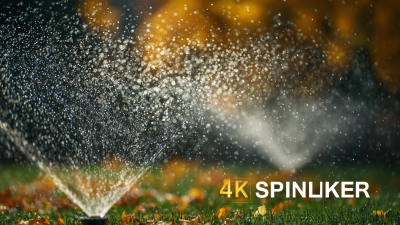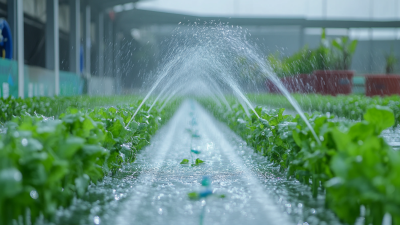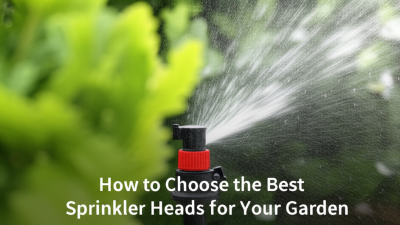Maximizing Irrigation Efficiency: Understanding the Role of Sprinkler System Valves in Sustainable Landscaping
Effective water management is crucial for sustainable landscaping, where the integration of technology can lead to significant advancements in the efficiency of irrigation systems.
 Sprinkler System Valves play a pivotal role in optimizing water distribution, directly impacting both plant health and water conservation efforts.
According to the Irrigation Association, proper valve management can improve system efficiency by up to 30%, reducing water waste while preserving the aesthetic appeal of landscapes.
Additionally, studies indicate that implementing advanced valve technology, such as smart controllers, can further enhance irrigation effectiveness, leading to a reduction in water usage by up to 50% in some cases.
As the demand for sustainable practices continues to rise amidst growing environmental concerns, understanding and utilizing Sprinkler System Valves becomes essential for landscape architects, gardeners, and homeowners aiming to achieve a balance between beauty and sustainability in their outdoor spaces.
Sprinkler System Valves play a pivotal role in optimizing water distribution, directly impacting both plant health and water conservation efforts.
According to the Irrigation Association, proper valve management can improve system efficiency by up to 30%, reducing water waste while preserving the aesthetic appeal of landscapes.
Additionally, studies indicate that implementing advanced valve technology, such as smart controllers, can further enhance irrigation effectiveness, leading to a reduction in water usage by up to 50% in some cases.
As the demand for sustainable practices continues to rise amidst growing environmental concerns, understanding and utilizing Sprinkler System Valves becomes essential for landscape architects, gardeners, and homeowners aiming to achieve a balance between beauty and sustainability in their outdoor spaces.
Understanding the Types of Sprinkler System Valves for Optimal Water Management
In sustainable landscaping, the importance of sprinkler system valves cannot be overstated. These valves are pivotal for optimal water management, serving as the control mechanism for water flow in irrigation systems. There are various types of valves, including manual, electric, and pressure-regulating valves, each playing a distinct role in maximizing irrigation efficiency. According to a 2022 report by the Irrigation Association, properly managed irrigation systems can reduce water usage by up to 30%, highlighting the critical role of valve selection in sustainable practices.
One essential tip for efficient water management is to utilize pressure-regulating valves, which help maintain consistent water pressure throughout the system. This consistency prevents over-watering and minimizes runoff, ensuring that each plant receives the right amount of water without wasting resources. Additionally, incorporating smart controllers with flow meters can provide real-time data, allowing users to adjust watering schedules based on weather conditions and soil moisture levels, further enhancing efficiency.
For landscape professionals, understanding the specific needs of the plants and the local environment is crucial. Selecting the appropriate valve types based on these factors can profoundly improve irrigation outcomes. For instance, using drip irrigation systems coupled with solenoid valves can direct water precisely to root zones, significantly reducing evaporation and improving overall water retention in the landscape. Embracing such technologies not only benefits the environment but also enhances the vibrancy of the landscape.
Evaluating the Impact of Valve Efficiency on Water Conservation in Landscaped Areas
The efficiency of irrigation systems plays a crucial role in sustainable landscaping, particularly through the optimization of sprinkler system valves. Inadequate or faulty valves can lead to excessive water waste and uneven distribution, undermining water conservation efforts. By understanding the function and maintenance of these valves, landscapers can significantly reduce water loss and ensure that every drop is utilized effectively.
Evaluating valve efficiency is essential for enhancing water conservation in landscaped areas. High-performance valves can adjust flow rates, preventing overwatered zones and ensuring that plants receive the appropriate amount of moisture. Regular checks and replacements of outdated or malfunctioning valves will not only improve the overall effectiveness of the irrigation system but also support environmental sustainability by reducing the strain on local water resources. Investing in advanced valve technology can lead to long-term savings and promote healthier landscapes, showcasing the direct link between valve efficiency and effective water management.
Integrating Smart Technology with Sprinkler Valves for Enhanced Irrigation Control
The integration of smart technology with sprinkler system valves plays a crucial role in enhancing irrigation control, leading to significant improvements in water conservation and landscape health. According to the Irrigation Association, properly managed irrigation can reduce water waste by up to 50%. Smart valves allow for precise control over the flow and timing of water application, ensuring that landscapes receive exactly what they need, when they need it. This level of control is particularly beneficial in regions prone to drought, where maximizing water use efficiency is critical for sustainability.
Furthermore, smart irrigation systems utilize weather data and soil moisture sensors to adapt in real-time to changing environmental conditions. A study published by the American Society of Agricultural and Biological Engineers highlights that smart systems can achieve water savings of 20-50% compared to traditional methods. By leveraging these technologies, landscape managers can not only improve the efficiency of their irrigation systems but also promote healthier plant growth and reduce operational costs. As more professionals adopt smart irrigation technologies, the potential for sustainable landscaping practices increases, paving the way for greener and more resilient urban environments.
Best Practices for Maintaining Sprinkler System Valves to Maximize Performance
Maintaining sprinkler system valves is crucial for ensuring optimal irrigation efficiency in sustainable landscaping. Regular inspection and cleaning of valves can prevent clogs and ensure that water distribution is uniform across the landscape. It is essential to check for leaks regularly; even a small leak can lead to significant water wastage over time. Moreover, replacing worn-out or damaged valves promptly will enhance the overall performance of the irrigation system.
In addition to regular maintenance, adjusting the valve settings to match the specific needs of different plants and soil types can significantly improve water usage. Utilizing timers and smart irrigation technology helps in automating the watering process based on weather conditions, thus minimizing water waste. Homeowners and landscapers should also familiarize themselves with the parts of their sprinkler system, as understanding how each component works can lead to more effective maintenance practices and better landscape health.

Analyzing the Cost-Benefit of Upgrading to Modern Valves in Sustainable Landscaping
 Upgrading to modern sprinkler system valves can significantly impact the cost-effectiveness of sustainable landscaping. According to a report from the Irrigation Association, water-efficient irrigation technologies, including advanced valves, can reduce water usage by up to 30%. By investing in these modern systems, landscapers can not only ensure optimal water distribution but also lower utility costs in the long run.
Upgrading to modern sprinkler system valves can significantly impact the cost-effectiveness of sustainable landscaping. According to a report from the Irrigation Association, water-efficient irrigation technologies, including advanced valves, can reduce water usage by up to 30%. By investing in these modern systems, landscapers can not only ensure optimal water distribution but also lower utility costs in the long run.
Moreover, while the initial investment may seem high, the return on investment is substantial. Studies indicate that new valve systems can increase landscape health by providing precise watering, which can reduce the need for both chemical treatments and maintenance efforts, yielding an estimated savings of up to 50% in overall landscape management costs.
Tip: When considering an upgrade, evaluate the compatibility of new valves with existing systems to avoid unnecessary modifications, thus maximizing your investment.
Tip: Keep in mind that regular maintenance of modern valves ensures they perform at peak efficiency, helping you save more on water bills.
Tip: Look for valves with smart technology capabilities that can adjust watering schedules based on real-time weather data, further enhancing efficiency and sustainability.
Related Posts
-

5 Tips to Optimize Your Sprinkler Control Valve Sign for Maximum Efficiency
-

Ultimate Guide to Best Sprinkler Systems Installation: 7 Key Specifications You Must Know for Optimal Efficiency
-

Discover Cutting Edge Sprinkler Systems at the 137th Canton Fair 2025 for Global Buyers
-

How to Choose the Best Sprinkler Heads for Your Garden
-

Exploring Innovative Alternatives to Traditional Fire Sprinkler Systems for Enhanced Safety
-

Discovering the Advantages of Fire Mist Systems for Enhanced Safety and Efficiency
